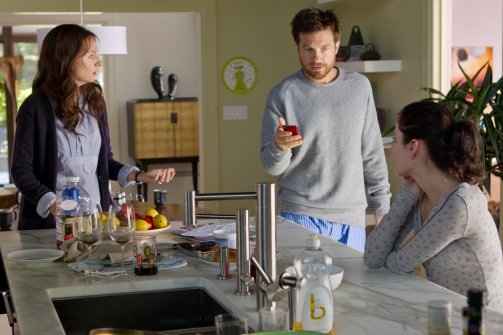Culture
Disjointed parts at a “Disconnect”

Disconnect
dir. Henry-Alex Rubin
Release Date: Apr 12, 13
- 1
- 2
- 3
- 4
- 5
- 6
- 7
- 8
- 9
- 10
A lawyer too busy to turn off his phone and spend time with his family. A teenager bullied at school via Facebook. A runaway who sells his body on the internet for gift incentives. A mother who lost her child and finds solace by way of a stranger on a message board. A boy whose father won’t give him any attention. A private investigator with a dark past. A reporter whose shocking expose could destroy her subject’s life. A husband who feels emasculated after his identity is stolen. These are the stories intertwined in Disconnect, an odd hybrid of Crash and Catfish that never met a moment of human connection or a heavy-handed emotional appeal it didn’t like.
If only Disconnect was about one specific plot thread out of the many it offers. There is one story at the heart of Murderball director Henry-Alex Rubin’s film that would make a potent drama on its own. The story of Ben (Jonah Bobo), a withdrawn teenager who becomes the victim of a hideous internet prank, is Disconnect’s trump card. Bobo communicates a lot with little dialogue, and when he speaks, it’s as though he’s choking out every possible word. When Ben sets off on an online relationship with a fake classmate devised by two of his peers, potentially tragic consequences await. Even the payoff to Ben’s story is the film’s one great offering, in that unlike every other story, no easy answers are offered, just an honest sense of hope.
If only any of the other stories had this kind of power. This isn’t to say that the Ben storyline is subtle by any stretch, but it feels more organic than anything else in Disconnect. The next best part of the film is whenever Andrea Riseborough appears as Nina, an up-and-coming reporter who begins engaging a webcam hustler (Max Theriot) for a story about homeless youth being lured into sex trafficking. Until the film starts drumming up unnecessary romantic tension between the two, there’s an ease to the exchanges between Riseborough and Theriot. In that idea lies the major issue with Disconnect: many of the stories start well enough, but go to the most overcooked places possible in each scenario just to drum up a burst of third-act catharsis that feels not only hokey, but totally unearned.
Most of the cast not knowing how to hit their respective notes doesn’t help. Jason Bateman takes a stab at drama as Ben’s father, and though Bateman is solid enough, he’s given a deeply unlikable role. One could play a drinking game in which sips are taken every time Bateman’s Rich Boyd ignores his family’s near-constant pleas to spend time with them, even when the dramatic stakes begin to build. At least it’s not as bad as Alexander Skarsgard’s dweebish husband, or Paula Patton as his long-suffering wife. It’s been a while since a melodrama with such a fake couple has come along, especially when their pursuit of the person who stole their identity turns into a mixture of couples therapy and foreplay. In general, Disconnect lives up to its title in a way Rubin surely didn’t intend; nothing fits together particularly well for all the film’s ham-handed efforts, and very little of the film successfully makes the deep statement about emotional distance in a technological era that Rubin is aiming for. If he just wants everybody to turn their phones off, a PSA would have sufficed.